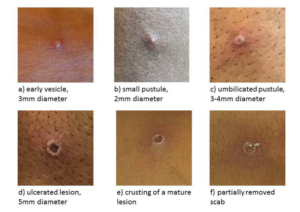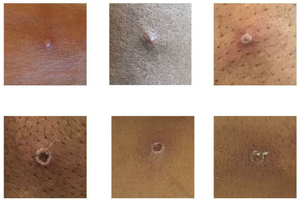Monkeypox cases in gay men in the UK: BHIVA and ECDC rapid statements
1 June 2022. Related: mpox, Coinfections and complications.

On 7 May 2022, cases of monkeypox virus (MPV) were reported in the UK. Later updates confirmed 9 cases by 18 May, 20 cases by 20 May, 77 cases by 24 May and 227 cases by 3 June. [1]
Most cases were not linked to travel to countries where monkeypox is more common. They were, however, largely reported in gay or bisexual men, with the likelihood that transmission occurred in the UK.
This led to a rapid statements from BHIVA on the potential implications for people living with HIV, that has since been updated. [2]
This includes limited data on HIV and MPV coinfection, but does not include specific recommendations for people living with HIV. So far, HIV is not linked to any difference in symptoms and outcomes.
The statement will be updated as more information becomes available, including whether immune suppression is associated with any increased risk. It also includes information on treatment and vaccination, although cases are also too few for prophylaxis to be currently needed (unless there has been recent contact with a confirmed case).
One of the smallpox vaccines (Imvanex, non-replicating) protects against MPV and this can be used in people living with HIV. The vaccine is being offered to contacts of people with MPV to help stop further spread. However, BHIVA recommend that live vaccines are not recommended for people with reduced immunity (CD4 <200 cells/mm3). [3]
Symptoms include fever, headache, muscle aches, backache, swollen lymph nodes, chills and exhaustion. A rash typically begins on the face and then spreads to other parts of the body including the genitals (especially in the recent cases). The rash can look like chickenpox, syphilis, herpes or varicella zoster (VZV), with distinct stages shown below.
The incubation period is usually 6 to 16 days but can be up to three weeks. Most people recover without complications. When the scab falls off a person is no longer infectious. [4, 5]
Recent UK cases reported rash that varied from 10 to 150 lesions. [6]
Sexual health clinics in central London report that MPV is affecting gay men in London. They advise people who are worried about similar symptoms to phone a clinic but not to attend drop-in services. This is to also protect sexual health services as staff in contact with cases would also need to isolate. Also, do not share sheets and towels or to have sex until MPV has been ruled out. [7]
As this issue of HTB went to press, more than 900 cases had been reported globally in 28 where MPX is not endemic countries. [8, 9, 10]
comment
As many reported cases have not been linked, the extent of transmission networks is currently unclear, but is likely to be much larger.
Until more information becomes available over the next few weeks, there is good reason to be cautious.
Luckily, most cases of monkeypox resolve within a few weeks without complications.
Treatments are available, including the use of vaccines. For details see BHIVA vaccine guidelines. Advice is for potential cases to self-isolate for 21 days.
Unless this is taken seriously, numbers could easily increase considerably over the next two weeks.
More serious outcomes, including that monkeypox becomes endemic in Europe, is emphasised by the European Centre for Disease Prevention and Control (ECDC) who have published the most comprehensive review of cases so far. [11]
This is currently estimated to be a low risk, but will depend on how effectively further transmission is prevented.
Numbers of cases are being tracked and updated online, currently with more than 900 confirmed infections. [12]
i-Base has published a non-technical factsheet on monkeypox that will be updated as needed.
https://i-base.info/monkeypox
References
- UK Health Security Agency (UK-HSA). Monkeypox cases confirmed in England – latest updates. (7 May 2022).
https://www.gov.uk/government/news/monkeypox-cases-confirmed-in-england-latest-updates - BHIVA rapid statement on monkeypox virus. (17 May 2022, updated 31 May).
https://www.bhiva.org/BHIVA-rapid-statement-on-monkeypox-virus - BHIVA. BHIVA guidelines on the use of vaccines in HIV-positive adults 2015.
https://www.bhiva.org/vaccination-guidelines - European Centre for Disease Prevention and Control (ECDC) .Monkeypox cases reported in UK and Portugal/ (19 May 2022).
https://www.ecdc.europa.eu/en/news-events/monkeypox-cases-reported-uk-and-portugal - UK Health Security Agency (UK-HSA). Monkeypox. (Updated 18 May 2022).
https://www.gov.uk/guidance/monkeypox - Seven cases of monkeypox virus in the UK from 2018 to 2021. HTB (26 May 2022).
https://i-base.info/htb/42959 - 56 Dean Street. Monkeypox alert.
https://www.dean.st/health-amp-wellbeing/monkeypox-alert-2022-ukhsa - STAT news. U.S. monkeypox case reported, as Spain, Portugal report infections in growing outbreak. (18 May 2022).
https://www.statnews.com/2022/05/18/spain-portugal-report-monkeypox-cases-raising-specter-of-wider-outbreak - STAT news. 17 suspected monkeypox cases seen in Montreal, as European tally increases. (18 May 2022).
https://www.statnews.com/2022/05/19/17-suspected-monkeypox-cases-seen-in-montreal-as-european-tally-increases - Australia’s first monkeypox case spotted by GP. (19 May 2022).
https://www1.racgp.org.au/newsgp/clinical/gp-identifies-first-probable-monkeypox-case-in-aus - European Centre for Disease Prevention and Control (ECDC). Monkeypox multi-country outbreak: rapid assessment report. (23 May 2022).
https://www.ecdc.europa.eu/en/publications-data/risk-assessment-monkeypox-multi-country-outbreak (download page)
https://www.ecdc.europa.eu/sites/default/files/documents/Monkeypox-multi-country-outbreak.pdf (PDF) - Monkeypox case tracker.
https://monkeypox.healthmap.org - EACS/ECDC. Informal webinar given on 24 May 2022.
Monkeypox EACS/ECDC webinar 1 (PDF) - EACS/ECDC. Informal webinar given on 31 May 2022.
Monkeypox_EACS/ECDC_webinar 2 (PDF)
This report was first published on 18 May 2022 and will continue to be updated as needed.


